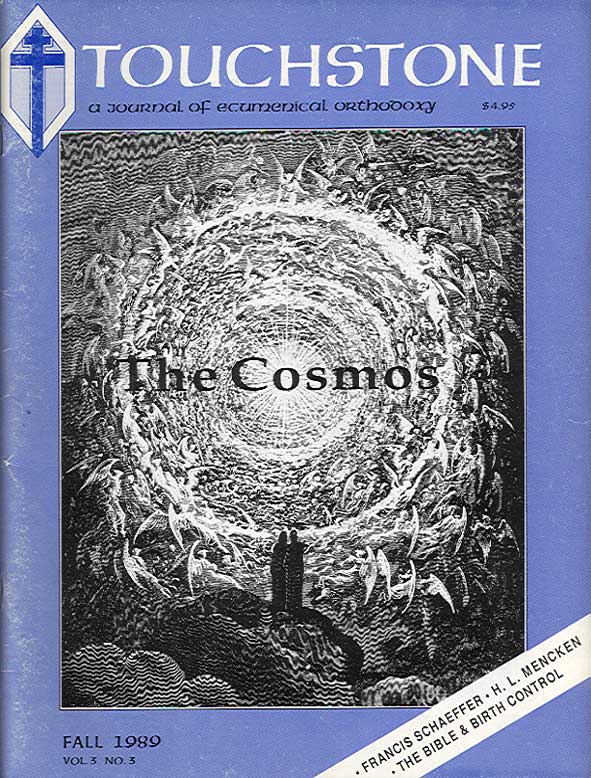The Man for Whom the World was Made
by George L. Murphy
Human beings are always fascinated by questions about origins. Where did the universe come from, and how did we get here? The opening chapters of Genesis have given us some of our favorite religious images. Today’s scientists have new tools with which to explore the universe, and a great deal has been learned about the origins of life and the universe in the past century. But when we contemplate the results of looking billions of years into the past and billions of light years into space, we are still driven to ask questions that men and women asked millennia ago: What is the point of it all? Is there any meaning to this world in which we participate?
Christians have never had any doubt that God has a purpose in creation. We may not be able to understand that purpose, and perhaps “cannot find out what God has done from the beginning to the end.” (Eccl. 3:11) In fact, any attempt to explain why God created the universe runs into the danger of suggesting that God had to create for some reason. No, God creates in freedom. But we are told that God did not create the world a chaos (Is. 45:18), and we are given a vision of the completion of God’s work in the Book of Revelation.
Scientific developments have forced us to discard some ideas about God’s design in creation. Modern astrophysics has shown that births and deaths of stars are still occurring, so that we know that the stars were not all simply set in place in the beginning. The Darwinian theory of evolution argues that life has developed through a process of natural selection, rather than having had all its features displayed when the world was young. It isn’t surprising, then, that some scientists and philosophers have come to doubt that there is any meaning or purpose to the universe. Scientifically, they argue, we can only seek to understand the world as it is, and can’t explain why it is that way.
The Scientific Anthropic Principle
But recent work in cosmology has led some scientists to wonder if the universe does “just happen” to be as it is. Doubts about the accidental character of the world stem from discoveries that a universe much different from ours would not have allowed the development of the kind of life that we know. The idea of the apparent fitness of the cosmos for our species has found expression in recent years as the “anthropic principle,” and has become a fairly hot topic among scientists. Barrow and Tipler’s The Anthropic Cosmological Principle 1 provides a massive treatment of the subject, to which I would refer the reader for further details on some points I will consider. There are also briefer and less technical surveys available.2
Perhaps the simplest example with which to begin a discussion of the anthropic principle is the basic force of gravitation. There is a gravitational pull between any two pieces of matter in the universe which depends on the masses of the bodies and the distance between them. Two masses of one kilogram separated by a meter attract one another with a force of about fifteen-trillionths of a pound. That seems a quite arbitrary value, and we can easily imagine universes in which gravity would be stronger or weaker. But if gravity were much stronger than it is, the expansion of the universe which is now generally thought to have begun in the Big Bang would quickly have been brought to a halt and the universe would have collapsed long before life could develop. And if gravity were much weaker than we experience, the universe would have thinned out so quickly that no stars or planets would have formed. Again, life as we know it would not have come about.
So tinkering with the strength of gravity would probably have produced a universe in which life with a physical and chemical basis like ours was impossible. Tinkering with other numbers which characterize our universe, such as the strengths of electromagnetic or nuclear forces, would have had a similar effect. It seems as if the universe is just right for humanity.
One can, of course, speculate on the possibilities for life forms which have a fundamentally different physico-chemical basis from ours. But at present we know nothing scientifically about how life might develop in, for example, a cloud of pure hydrogen. We cannot absolutely rule out the possibility of life that is not carbon-based, does not require water, and so forth, but at present we have to leave consideration of such possibilities to science fiction, for we have no scientific evidence even to suggest any probability of such life.
A precise statement of the anthropic principle can take several forms. A weak version is simply the observation that the universe as we know it is compatible with human life. To this extent the anthropic principle is not particularly speculative or controversial. If regarded simply as the statement “we are here,” it may even seem trivially obvious. But it is not trivial, for it is far from obvious a priori that a universe will satisfy the rather stringent physical conditions for life.
But there are stronger, more speculative, and more controversial versions of the anthropic principle which state that in some sense the universe must be compatible with intelligent life, or even that such life must indeed develop. These stronger versions are no longer simply statements about the physical parameters of the universe and of living systems, but are far-reaching claims about two-way relationships between the universe and the life which can exist in it.
Stronger versions of the anthropic principle may simply express the belief that the fitness of the universe for life must be “more than coincidence.” But some versions, such as Wheeler’s “Participatory Anthropic Principle,”3 depend upon the critical role which observation, and therefore observers, play in modern quantum theory. At the atomic level, it does not seem to be possible to describe physical processes without consideration of the type of observation which is carried out on them. Quantum theory allows us to calculate probabilities for events to occur, and demands that there be an observation of the physical system in order for any one of the events to become a known certainty. (This involves the so-called “collapse of the wave packet.”) In one standard example in which a beam of electrons strikes a screen with holes in it, the pattern of electrons passing through the screen depends on whether or not one observes which hole each electron goes through.4 This kind of result leads some theorists to take the strong position that an event must be observed in order to exist.5
(It should be emphasized that we are talking here about real acts of observation, which involve physical apparatus—Geiger counters, eyes, etc.—as well as conscious minds. Thus what is in view here is not just an idea that the mind creates its own reality, as in the more simplistic versions of New Age thought.)
Such an idea may seem very speculative, and some may be reminded of the views of the eighteenth-century bishop/philosopher George Berkeley. Certainly the claim that the existence of events requires observation is an extreme position which not all physicists or philosophers of science would take. But those who do take such a position feel driven to it by the facts of quantum physics, and not by any a priori commitment to idealistic philosophy. Any theory based on this idea should therefore be regarded as speculative, but not on that account outside the realm of legitimate scientific theorizing.
If observers are necessary in order for events to have meaningful existence, then there must be physical observers in order for there to be a physical universe. Thus we would be led to a version of the anthropic principle asserting that in order for the universe to exist, life must develop within it. Given the necessity of intelligent observers, some have gone on to speculate that intelligent life cannot die out but must continue forever, evolving toward ever greater intelligence and control of the universe.
A Christian Theanthropic Principle
Faced with these anthropic principles, Christians can hardly help but ask whether or not they might have anything to do with the traditional understanding of God as the creator of the universe. Care is necessary here. It is a serious theological error to canonize any particular scientific theory, as the medieval church tended to do with the Aristotelian understanding of the world. Still, it is important for theology and science to be in dialogue. Theologians need to be in touch with what is going on at the frontiers of science, and to see what light the Judaeo-Christian tradition can shed on fundamental questions that are being asked there. That tradition does have some important things to say about a cosmic significance for humanity. Our goal should be neither to provide theological sanction for scientific versions of the anthropic principle nor to make our religious view of the role of humanity depend on current scientific results, but to see whether scientific and theological views have any parallels and can mutually inform one another.
At first glance the anthropic principle might simply seem to allow another revival of the old Argument from Design: Since the universe is so finely tuned for life, there must have been a “Tuner,” a God who created the world. A Christian may interpret at least the weak form of the anthropic principle as the traditional idea that God created a universe for humans to inhabit.
But the anthropic principle can serve to challenge us to consider a more profound aspect of Christian thought. The stronger forms of that principle do not look only to a purposeful creation in the beginning, but suggest a fundamental role for humanity in the middle of cosmic history, and point toward a culmination of that history in humanity. The anthropic principle suggests that we need to consider creation from the end as well as from the beginning.
God is spoken of in Scripture as the first and the last (Is. 44:6), “the Alpha and the Omega.” (Rev. 1:8) God created the heavens and the earth in the beginning (Gen. 1:1), and in the end will “be everything to everyone.” (2 Cor. 15:28) But even to speak of God in that way does not reveal the full depth of the Christian vision. The New Testament speaks of a central role for humanity in the history of the universe, and to that extent there is a parallel with scientific statements of the anthropic principle. In the Bible, however, the focus is not merely on humanity as a product of human evolution, but on that humanity indwelt by the One through whom the universe was made.
The Letter to the Colossians says that all things were created in Christ:
For in him all things were created, in heaven and on earth, visible and invisible, whether thrones or dominions or principalities or authorities—all things were created through him and for him. He is before all things, and in him all things hold together. He is the head of the body, the church; he is the beginning, the first-born from the dead, that in everything he might be pre-eminent. For in him all the fulness of God was pleased to dwell, and through him to reconcile to himself all things, whether on earth or in heaven, making peace by the blood of his cross. (1:16–20)
Not only are “all things” created through him, but they are also created for him. It is in the human Jesus Christ that the universe has its fulfillment. And so in Rev. 22:13, it is Jesus who applies to himself the divine titles “the Alpha and Omega, the first and the last, the beginning and the end.” Thus the New Testament presents us with what we might call a theanthropic principle: God has created a universe in which human life can develop, and God has personally united himself with humanity, and thus with the whole universe, in order to bring the creation to its fulfillment.
Of course this theanthropic principle rests on a basis quite different from the anthropic principles discussed earlier. The theological statement comes from God’s revelation in Jesus Christ, and not from anything about the strength of gravitation or the quantum-mechanical theory of observation. But the strong scientific forms of the anthropic principle, which, as far as they go, do not seem to be incompatible with the theanthropic principle, call our attention to this theological theme with special urgency. Thus science plays at least a suggestive role for theology here.
Physical reality, that accessible to natural science, does not exhaust the creation. Christian theology has generally spoken of invisible angelic creatures and/or the spiritual meaning of the physical, social, and political structures that exist within our world. These are ways of understanding the thrones, dominions, principalities, and authorities of Colossians 1.6 Natural science does not say anything for or against the existence of such realities, which the New Testament argues are also brought to their fulfillment through the cross and resurrection of Christ. This is one illustration of the fact that the theanthropic principle has a larger scope than do the scientific anthropic principles.
The ideas of a number of theologians already provide some suggestions for the formulation of a theanthropic principle: Scientific developments, while provocative, have not taken theology completely by surprise. We may note, for example, some of the ideas of Karl Barth, Wolfhart Pannenberg, and Jurgen Moltmann.7 But perhaps we will think first of Teilhard de Chardin, who made use of the ultimate eschatological title of Christ when he designated the future convergence point of the universe as “Omega.”8
The theanthropic principle means that God’s future is in an important sense known to us. It has been made known to us in God’s revelation in Christ, and is in fundamental ways continuous with Jesus of Nazareth who was born, died, and rose again some two thousand years ago on this earth—the Jesus who is our brother. Of course we may expect that before the termination of the universe’s history, the human race will encounter many incredible phenomena that we can scarcely dream of today. But the center of all of that will be God Incarnate, Jesus Christ.
The universe was created with humanity in view, but not for humanity as an end in itself. In creating men and women, God created the possibility that the dwelling of God might be with humanity in creation. (Rev. 21:3)9 It is appropriate, as long as the observational evidence warrants it, for science to speak of an anthropic principle, but theology cannot be content to stop with that. It must speak of God present with humanity in Jesus Christ, of a theanthropic principle, and look to God Incarnate as the head of a new humanity, the Body of Christ, in which the universe finds its fulfillment. •
Notes:
1. Barrow, John D. and Tipler, Frank J., The Anthropic Cosmological Principle
(Oxford, 1986).
2. E.g., Rothman, Tony, “A ‘What You See Is What You Beget’
Theory”, Discover, May 1987, p. 90.
3. Wheeler, John A. in Foundational Problems in the Special Sciences,
ed. R. E. Butts and J. Hintikka (Reidel, 1977), p. 3. Barrow and Tipler, The
Anthropic Cosmological Principle, Chapters 1 and 7.
4. E.g., Feynman, Richard P., Leighton, Robert B., and Sands, Matthew, The
Feynman Lectures on Physics (Addison-Wesley, 1965), Volume III, Chapters
1–3. For a detailed survey of interpretations of quantum mechanics see
Jammer, Max, The Philosophy of Quantum Mechanics (John Wiley, 1974).
5. See Barrow and Tipler, The Anthropic Cosmological Principle, Chapter
7, and references given there.
6. For some consideration on the “elements of the universe” and
“principalities and powers” in connection with modern science and
technology see Murphy, George L., “Toward a Theology of Technological
War”, Dialog, Winter 1988, p. 48.
7. Barth, Karl, Dogmatics in Outline (Harper & Row, 1959), Chapter
10. Pannenberg, Wolfhart, Jesus—God and Man, (Westminster, 1977),
pp. 390–397. Moltmann, Jurgen, The Future of Creation (Fortress,
1979).
8. E.g., Teilhard de Chardin, Pierre, The Phenomenon of Man (Harper
& Brothers, 1959).
9. It is worth noting that the Hebrew canon, which begins with the creation
of the world in Genesis, concludes with the direction to rebuild “a house”
for “the God of heaven” in 2 Chron. 36:23. (Kogan, Barry S. in Creation
and the End of Days, ed., David Novak and Norbert Samuelson (University
Press of America, 1986), p. 98. This eschatological theme is developed in the
New Testament in Jn. 2:18–22 and Rev. 21:22.
George L. Murphy is pastor of St. Mark Lutheran Church (ELCA), Tallmadge, Ohio. He holds a Ph.D. in physics from Johns Hopkins University and has taught college physics for twelve years.
subscription options
Order
Print/Online Subscription

Get six issues (one year) of Touchstone PLUS full online access including pdf downloads for only $39.95. That's only $3.34 per month!
Order
Online Only
Subscription

Get a one-year full-access subscription to the Touchstone online archives for only $19.95. That's only $1.66 per month!
bulk subscriptions
Order Touchstone subscriptions in bulk and save $10 per sub! Each subscription includes 6 issues of Touchstone plus full online access to touchstonemag.com—including archives, videos, and pdf downloads of recent issues for only $29.95 each! Great for churches or study groups.
Transactions will be processed on a secure server.
more on science from the online archives
more from the online archives
calling all readers
Please Donate
"There are magazines worth reading but few worth saving . . . Touchstone is just such a magazine."
—Alice von Hildebrand
"Here we do not concede one square millimeter of territory to falsehood, folly, contemporary sentimentality, or fashion. We speak the truth, and let God be our judge. . . . Touchstone is the one committedly Christian conservative journal."
—Anthony Esolen, Touchstone senior editor













